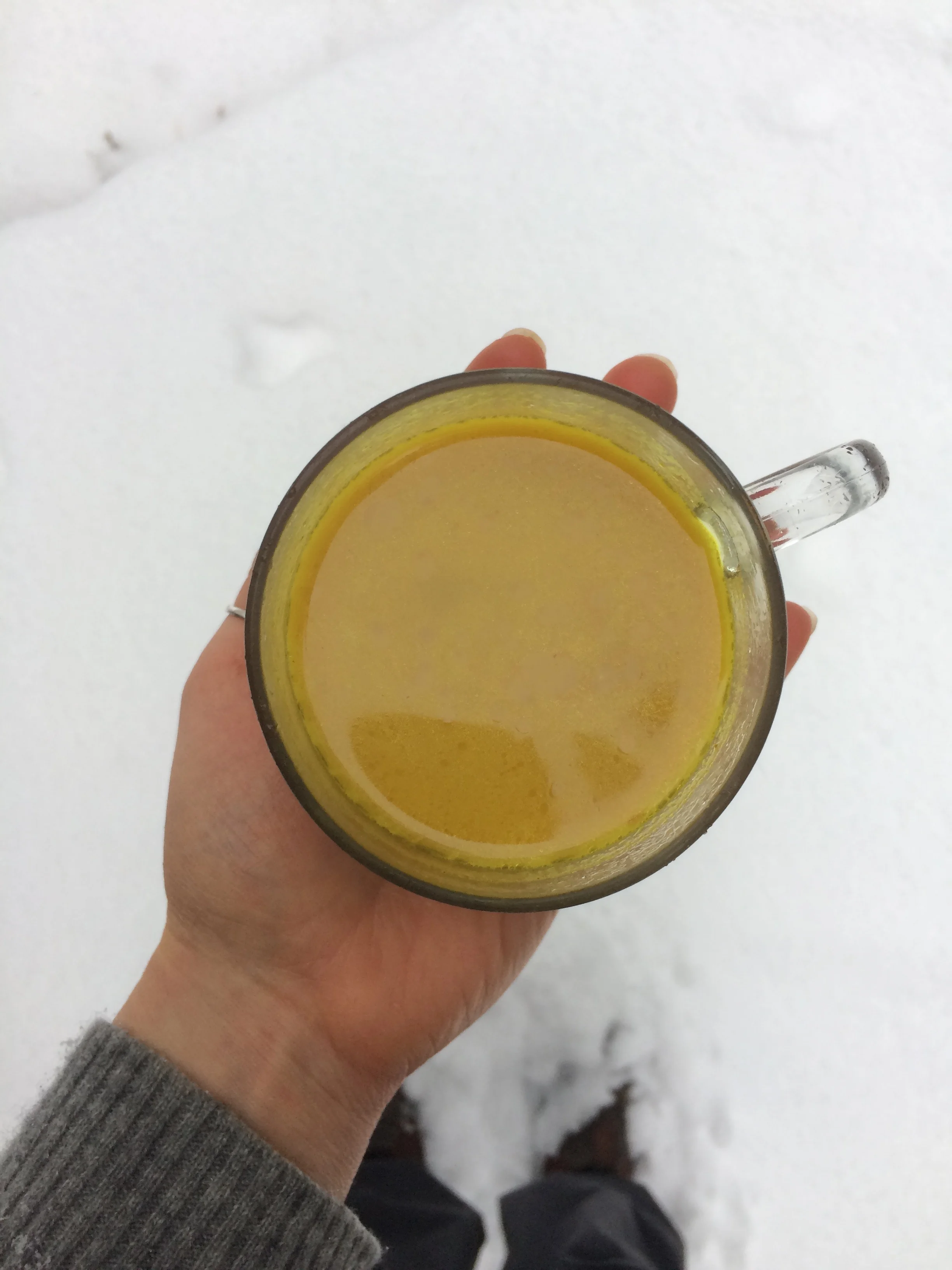Golden Milk
It’s a snow day today and I’m making golden milk! A favourite warm drink. Turmeric has a long history of use in Ayurvedic medicine, and is common in places of the world such as India, China, Polynesia, and Thailand. It is used as a medicinal plant and culinary spice. The primary active constituent, (at least, that we know about right now) is called as curcumin. I love this elixir because it is warm, nourishing, and just feels gooood in the belly.
Recipe:
½ c. coconut milk (full fat)
1 c. water
2 tsp. turmeric powder
1 grind black pepper
2-3 crushed cardamom pods, or 2 pinches of ground cardamom
3-4 slices of fresh ginger root, or 2 pinches ground ginger
4-5 pinches cinnamon
1 tsp. honey, or to taste
Add all ingredients to a small saucepan, except for the honey. Whisk together well. Simmer on medium-high, whisking frequently until about 1/3 of the liquid boils off. Stir in honey and pour into a mug. Enjoy!
A note on ingredients:
This recipe is, like most of my recipes, very flexible based on your personal tastes. Add more coconut milk for a richer drink, and more or less of the other spices as you prefer. It’s tasty without any honey at all. The essential components are the black pepper and coconut milk, both of which aid in the absorption of turmeric which otherwise is generally not well absorbed.
Note also that turmeric is a very beautiful golden yellow dye! It will stain your cutting boards, counter tops, wooden utensils, and clothing. Metal pots/whisks/spoons are safe. Use carefully.
Health benefits:
Turmeric, or Curcuma longa, is a very strong anti-inflammatory, and certainly the herb du jour. It is being studied as helpful for conditions as diverse as arthritis, cancer, mental health, diabetes, gingivitis, digestive concerns, and Alzheimer’s. It is an active area of research, which cannot be said for most of herbal medicine. If you think it might be helpful for you, inquire with your health provider for guidance as to how to use it therapeutically. Dose, form, and duration are all essential. Context too is important - curcumin may (or may not) be an appropriate single treatment, or is perhaps is better suited as an adjunct to a comprehensive treatment protocol drawing on drugs, herbs, diet & lifestyle modifications, or other strategies.
That being said, incorporating turmeric as a food source is a great addition to a healthy whole foods diet. The “standard American diet” or “SAD” diet as it’s known for short, is typically very inflammatory due to high amounts of processed foods, trans fats, sugar, and low quality meats. Foods that are high in vegetables, fruits, spices, and herbs, are not only far more nutrient dense but also anti-inflammatory due to their high content of various antioxidants. Let food by thy medicine! As so many chronic diseases are inflammatory in nature, choosing an anti-inflammatory diet is a great preventative strategy for long term health.
Resources:
From a biomedical perspective, here is a meta-analysis (a summary of multiple randomized controlled trials) that concluded turmeric and curcumin may protect against cardiovascular disease risk by improving serum lipid levels. Note also that they concluded that turmeric/curcumin is “safe, and no adverse events were reported in any of the included studies”. How many pharmaceutical drug can say that?
Here is a review from 2013 that attempted to summarize the research to date, and gives a good overview. And here is another meta-analysis that discussed the efficacy of turmeric for arthritis - 5 of the 8 studies that met their inclusion criteria found that turmeric/curcumin was equal in efficacy to pain medication.
From a heart-based perspective, here is an article from an herbalist and farmer that I think beautifully describes the sacred plant that is turmeric.
Disclaimer: Information can be empowering, but we all have unique health profiles and needs. Health-related information contained in this post is intended to be general in nature and should not be used as a substitute for a visit with a Naturopathic or other doctor.


